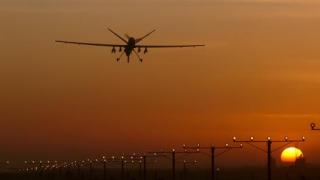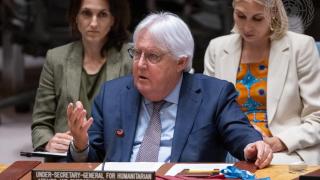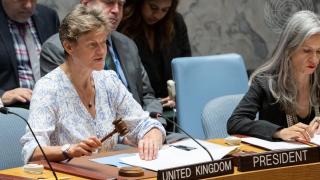
UN Special Rapporteur Ben Emmerson’s latest report reveals a concerning lack of transparency and accountability on behalf of those states using armed drones in conflict and non-conflict situations.
Published in March 2014, the report highlights dozens of lethal strikes in which civilian casualties appear to have been sustained and that have not been sufficiently investigated to date. Emmerson calls on the states responsible to fulfil their legal duty by providing a public explanation and justification for the use of deadly force.
Emmerson: “States must conduct a prompt, independent and impartial fact-finding inquiry and to provide a detailed public explanation of the results”
The 30 strikes highlighted in the report took place between 2006 and 2013 in Afghanistan, Pakistan, Yemen, Somalia and Gaza, and are thought to have been carried out by the US, Israel and the UK. The strikes include an incident in Chenagai, Pakistan in 2006, in which 69 children under the age of 18 are alleged to have been killed, and one in Yemen’s Abyan province in July 2011, where a police station was attacked killing up to 50 people, of whom 30 are thought to have been civilians.
Alongside the written report, the Special Rapporteur presented a web-based platform marking the location of the strikes.
Emmerson does not take a position in the report as to whether these strikes constitute violations of international humanitarian or human rights law. He states that the evidence that could confirm or dispel such suspicions “remains in the exclusive possession of the alleged perpetrator states” at present. The US and the UK rarely publish details of their armed drone operations and Israel has never officially acknowledged using such weapons.
This new document builds on the Special Rapporteur's previous report in identifying a number of legal ambiguities regarding the lethal use of drones in covert operations, in particular the interpretation of the principles of self defence, precaution, distinction and proportionality. It states there is an ‘urgent and imperative need’ for international consensus on these issues and recommends that further work take place at the UN Human Rights Council.
UNA-UK endorses the Special Rapporteur's call for greater transparency and accountability in drone operations. The Association will continue to call on UN Members States, in particular the UK, to build consensus across the international community on the pressing legal ambiguities outlined in the report. We will also continue to seek clarification from the UK Government as to whether UK intelligence has been used, or could in the future be used, to facilitate lethal drone strikes carried out by other states in non-conflict situations.
European action on drones and fully autonomous weapons
Until recently, the subject of drones barely featured at European Parliament. This changed on 25 February when a motion was passed by an overwhelming majority (534 to 49) expressing “grave concern over the use of armed drones outside the international legal framework” and urging the EU to develop a “common position” on the use of armed drones.
As well as calling on Member States to ensure they do not perpetrate unlawful targeted killings, the motion calls on them to ensure they do not “facilitate such killings by other states” – an issue that resonates in the UK given the widespread concern that UK-US intelligence sharing practices could potentially make the UK complicit in US actions.
The motion also calls for a ban on the “development, production and use of fully autonomous weapons which enable strikes to be carried out without human intervention”. This echoes the call made last year by UN Special Rapporteur on extrajudicial, summary or arbitrary executions, Prof. Christof Heyns, urging states to adopt a moratorium on the development of such weapons.
As a member of the Campaign to Stop Killer Robots, UNA-UK welcomes these developments at a European level and calls on the UK to endorse a moratorium on the development of fully autonomous weapons at a national level.





